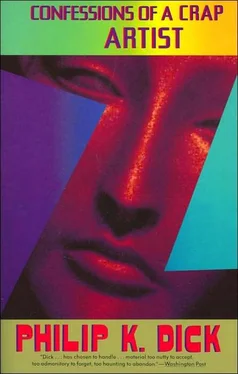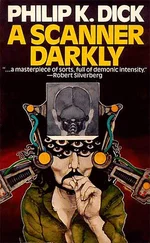“What do I do?” the witness asked.
“Well, you get up on the stand after Mr. Anteil; they’ll ask you to swear the same oath, at the same time as he. Then I’ll ask you, isn’t it true that you’ve lived in the County of Alameda for three months and in the state of California for over a year; you say yes. Then I ask you, isn’t it true that in your presence you saw the defendant, Mrs. Anteil, behave toward Mr. Anteil in a manner that caused him acute humiliation, and that because of this you saw him become mentally distressed and suffer both physical and mental privation that resulted in him having to consult a physician, and that there was a noticeable change in him that caused you to remark that he didn’t seem—” The lawyer gestured. “That he no longer seemed to be in the same good health and that he was visibly suffering as a result of Mrs. Anteil’s behavior toward him.” To both of them, he said, “See, we have to establish the result of Mrs. Anteil’s behavior. It isn’t sufficient to declare that she treated you badly—for instance, that she slept around or boozed or something—but that you actually suffered a noticeable change as a result.”
“A change for the worst,” the witness said.
“Yes,” the lawyer said. “A change for the worst.” To Nat he said, “I’m going to ask you isn’t it true that to the best of your ability you tried to preserve this marriage, but that your wife showed in clear and tangible fashion that she had no interest in your health and happiness, that she stayed away from the home for prolonged periods of time, showed obvious reluctance to inform you of her whereabouts during these prolonged intervals, and in general did not behave in the manner that a dutiful spouse would be expected to.”
Sipping his coffee, Nat thought to himself that this was going to be a terrible ordeal; he did not know if he could do it, when the time came.
“Don’t worry,” the lawyer said, touching him on the shoulder. “This is just a ritual; you get up there and chant the proper formula and then you get the thing you want—a divorce decree. You won’t have to say anything but yes; you just answer yes to the questions! ask you, and we’ll be out of there in twenty minutes.” He looked at his watch. “We should be getting back there. I don’t know about this judge, but they usually like to get started right at nine-thirty.” He was from Alameda County, and Nat had gotten him because once he had represented him and Gwen in a property dispute with some neighbors. Both he and she liked him. He had arranged the property settlement for both of them.
They returned to the courthouse. As they went up the steps, the witness discussed some trivial matters with the lawyer, having to do with the economic factor behind the decisions of courts. Nat did not listen. He watched an elderly man who sat on a bench with his cane in his lap, and a group of shoppers walking along the street.
The day was warm and clear. The air smelled good. Around the courthouse building, painters had thrown up canvas and ladders; the building evidently was undergoing alterations. The three of them had to stoop under ropes as they entered.
As his lawyer and witness entered the courtroom, Nat said to the lawyer, “Do I have time to go to the men’s room?”
“If you hurry,” the lawyer said.
In the men’s room—a remarkably clean place—he took a pill that Fay had given him, a tranquilizer. Then he hurried back to the courtroom. He found his lawyer and witness on their way back out; his lawyer took hold of his arm and led him into the corridor, frowning.
“I was talking to the bailiff,” he said in a low voice. “This judge doesn’t permit the attorney to lead.”
“What does that mean?” Nat said.
“It means I can’t ask either of you questions,” the lawyer said. “When you get up there, you’ll be on your own.”
“You can’t prompt us?” the witness said.
“No, you’ll have to tell your own stories.” The lawyer led them back toward the courtroom. “We probably won’t be first. Listen to the other cases and try to judge from them what you should say.” He held the door open, and Nat entered ahead of his witness.
Presently he found himself seated on a bench, like the pew of a church, watching a middle-aged woman on the witness stand telling how a Mr. George Heathens or Feathers had spilled coffee on Mrs. Feathers at a barbecue party in San Anselmo and that instead of apologizing he had called her a fool and a bad mother in front of ten people.
The witness became silent, and then the judge, a gray-haired heavyset man in his late sixties, wearing a pin-stripe suit, made a grimace of distaste and said, “Well, how did that affect the plaintiff? Did it cause any change in her?”
The witness said, “Yes, it caused her to become unhappy. And she said that she could not stand to be around a man who treated her that way and made her miserable.”
The case went on to its end, and then a second one, very similar, took its place, with new women and a new attorney.
“This is a tough judge,” Nathan’s lawyer said to him out of the corner of his mouth. “Look, he’s going through the property settlement. He’s really giving trouble.”
Nat scarcely heard him. The tranquilizer had begun to take effect, and he gazed out of the window of the courtroom, at the lawn. He saw cars going by along the street, and the windows of the shops.
To him, his lawyer whispered, “Say you had to go to a doctor. Say she made you physically sick. Say she was away for a week or more on end.”
He nodded.
On the stand a young, violently-nervous dark-haired woman was saying in a faint voice that her husband had hit her.
Nathan thought, Well, Gwen never hit me. However she had that fool in the kitchen with her that night when I got home. I can say that she was in the habit of going out with other men, and that when I questioned her as to who they were and what they did, she abused me and insulted me.
To their witness, his lawyer whispered, “You listen to what Mr. Anteil says and take your cues from him.”
“Okay,” their witness said.
She caused me distress and humiliation, Nathan thought. I lost weight and started taking tranquilizers. I lay awake at night worrying about money. She borrowed money and didn’t tell me about it. When she didn’t come home at night I had to call around to everyone we knew, thus notifying everyone that I had no idea where my wife was at night, or whom she was with. She ran up huge gas bills on our credit cards. She hit me, scratched me, called me dirty names in front of all kinds of people. She made it clear that she preferred the company of other men to me, and that she had little or no respect for me.
In his mind he rehearsed and rehearsed.
Not so much later he found himself up on the stand, facing the rows of empty seats and the few people. Slightly to his left and below him his lawyer stood tensely, holding a sheaf of papers and speaking very rapidly to the judge. Their witness sat ill at ease in the first chair of the jury box.
“Your full name is Nathan Ruben Anteil?” his lawyer said.
“Yes,” he said.
“And you live in Point Reyes Station in Marin County?”
“Yes,” he said.
“And you have been a resident of California for a period greater than one year, and a resident of Marin County for a period greater than three months? And you are the plaintiff in this dispute asking a divorce between you and Mrs. Anteil in the Superior Court of Marin County? And that the marriage between you and Mrs. Anteil ceased for all practical purposes on or about March 10, 1959, and that at this time you and she are no longer living together?”
He said yes to each question.
“Would you tell the court,” his attorney said, “the reasons why you seek a divorce from Mrs. Anteil.”
Читать дальше










